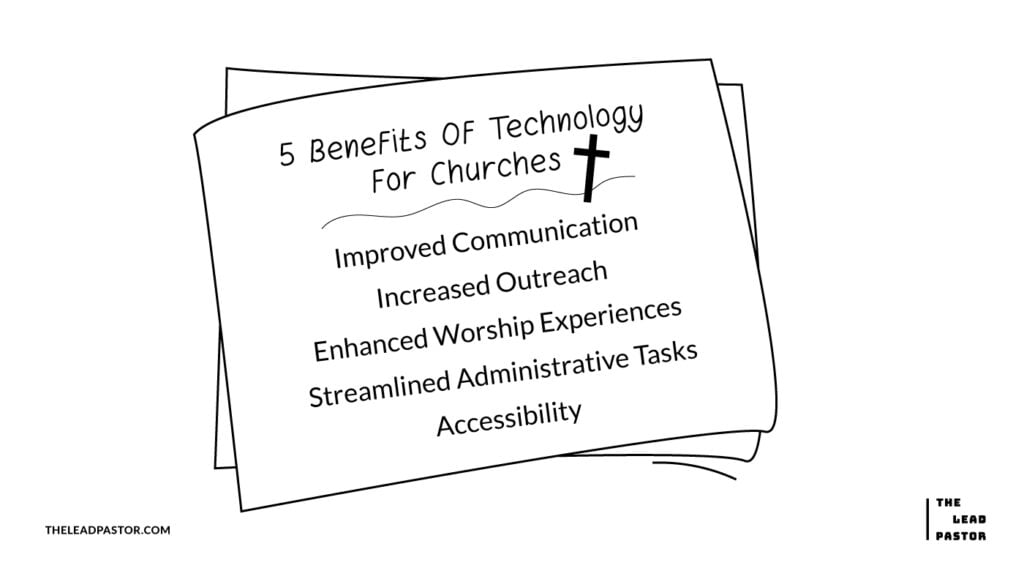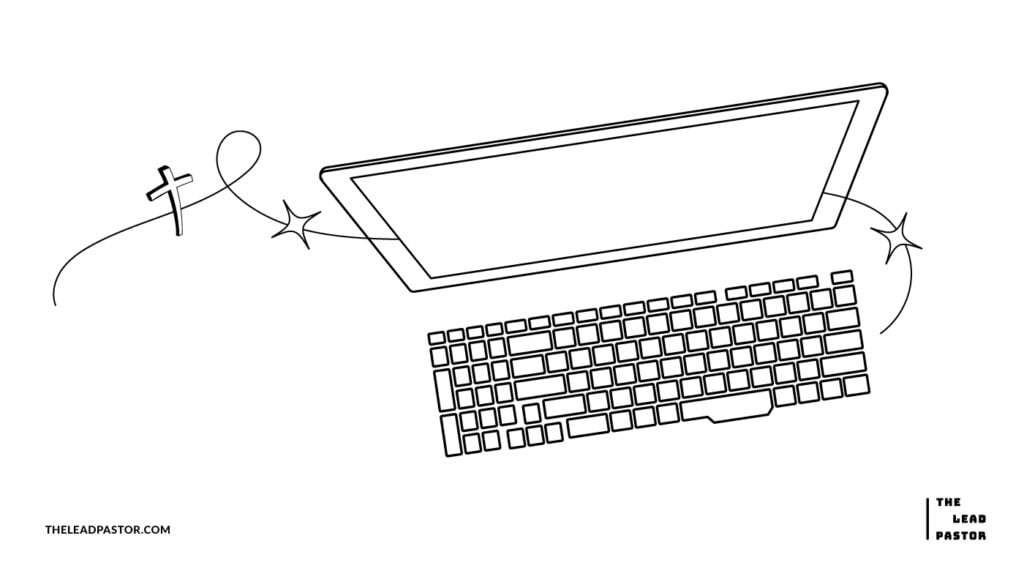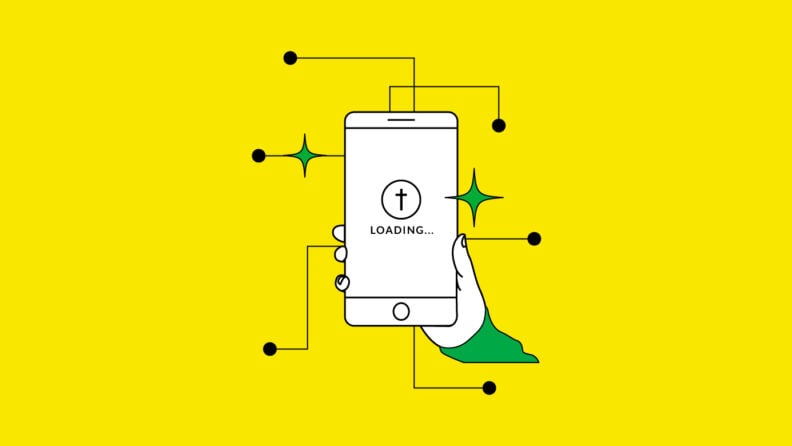Technological advances have revolutionized many aspects of our daily lives, and its impact is increasingly being felt in churches as well. While some pastors may be hesitant to embrace technology in the church, there are numerous benefits that can be gained by doing so.
From enhancing communication and outreach to improving worship experiences and streamlining administrative tasks, technology can help churches better serve their congregations and their mission.
In this article I will explore
- 5 Benefits Of Technology For Churches
- Drawbacks To Technology In The Church
- How Is Technology Being Used In The Church?
5 Benefits Of Technology For Churches
Let's be honest, originally I wanted to title this article “How 5 Benefits of Church Technologies Can Change Your life!” but thought perhaps that sounded a bit dramatic.
But stick with me here…
I'm old enough to remember when the church's biggest “technology” was the overhead projector. Anyone with me on this? I remember even being the “overhead projector person,” and the pastor telling me to stop running my fingers along the words as people were singing as it was actually more distracting than helpful.
From there, PowerPoint came into the picture, and before Elvanto and Planning Center, there was the ever so popular Excel spreadsheets that came to help with making schedules (although they were quite confusing to figure out at first).
With every new technology that arrived, I admit I felt confused and didn't think the church needed it, but looking back, I don't know how we did church without it!
So let's dive into the benefits of the use of technology in the church!

Improved Communication
Gone are the days of bulletins stuffed in your purse or Bible. Technology provides new ways for churches to communicate with their church members, including email, social media, and messaging apps that go straight to the church member’s iPhone.
This allows for more frequent and efficient communication, making it easier to share important news, updates, and events. I know for myself, I find it useful to get text messages to my cell phone about upcoming prayer meetings, Bible study, and small group reminders!
Increased Outreach
Technology can help churches reach new audiences and spread their discipleship message beyond their physical location. Online platforms like social media can allow churches to connect with people who may not have otherwise known about their services or events.
A good church website and church app can help attract new visitors and share important information about the church's missions, services, and events. Also, by using search engine optimization techniques, churches can ensure that their website appears in search results when people in their community search for relevant keywords.
Learn about how to create a church website here.
Enhanced Worship Experiences
Technology can be used to enhance worship experiences by providing visual aids, sound systems, and projection screens for song lyrics and scripture readings. This can help engage and inspire congregants during services.
Streamlined Administrative Tasks
Technology can also be used to streamline administrative tasks, such as managing donations and finances and scheduling events. Church management software (when operated according to best practices) can help automate these processes, freeing up time for church leaders to focus on other areas of ministry.
Accessibility
Technology can help make church services and resources more accessible to those who are unable to attend in person due to distance, illness, or disability. Live streaming, bible study podcasts, and online resources allow people to participate in church from anywhere in the world.
Drawbacks To Technology In The Church
I think it's only fair to also discuss the potential drawbacks to having technology in the church. It's also important to note that these drawbacks are not universal and may vary depending on the specific congregation and their individual needs and preferences.
Distractions
Technology such as screens, projectors, and sound systems can be visually and audibly distracting to some members of the congregation, making it difficult for them to focus on the service and their spiritual experience. This is why you should take it slow when it comes to adding technology.
Technical Issues
Yes it's true, technical issues can be a major drawback to having technology in church. They can interrupt the flow of the worship service and detract from the message that the pastor or speaker is trying to convey.
For example, if the sound system malfunctions, the congregation may struggle to hear the sermon or music, which can be frustrating and distracting. Similarly, if there are issues with the projection system or screens, it can be difficult for the congregation to follow along with the lyrics or scripture verses, leading to confusion and a sense of disconnection from the service.
Technical issues can also be time-consuming and expensive to resolve, particularly if specialized technicians need to be brought in to fix the problem. This can disrupt the schedule of the church and make it difficult to plan future services or events.
Additionally, if technical issues become a frequent occurrence, it can erode the trust and confidence that the congregation has in the church's ability to deliver a smooth and professional worship experience.
While technology can enhance the worship experience in many ways, it is important for churches to carefully consider the potential technical issues that may arise and have a plan in place to address them quickly and efficiently.
This may involve having trained volunteers or staff on hand to troubleshoot problems, investing in high-quality equipment and regular maintenance, and developing contingency plans for when technical issues do occur.
Cost
Pricing can be a significant drawback to having technology in churches because the initial investment and ongoing expenses can be significant, particularly for smaller or financially strained congregations.
For example, purchasing and installing audio and video equipment, projectors, screens, and lighting can be expensive, and the costs can add up if the church wants to upgrade or replace equipment in the future.
Additionally, maintaining and repairing technology can be a continuous expense. Regular maintenance is necessary to ensure that equipment is working properly and to prevent technical issues, which can be costly to resolve if left unchecked. Ongoing expenses for utilities and software licenses can also add up over time.
It's also important to consider if the cost of technology will put a financial burden on the church congregation, particularly if the church is already struggling to meet their financial obligations. This can cause tension and conflict within the church community, especially if there is disagreement over whether the benefits of technology justify the expenses.
Dependence
Churches may become overly reliant on technology, which could lead to a loss of the personal touch that comes with more traditional forms of worship. Churches can become overly reliant on technology when it is used as the sole means of delivering the worship experience or is seen as indispensable.
It is important for churches to maintain a balance between incorporating technology into their worship practices and maintaining traditional forms of worship and human connection.
I think we saw this a lot during the pandemic—Zoom fatigue became a real thing and we all craved that face to face contact.
How Is Technology Being Used In The Church?

Software is currently being used in various ways in churches, from managing church operations to enhancing the worship experience.
Here are some examples below!
Church Management Software
Church management software is used to manage church operations, such as membership tracking, financial management, events put on by your church event management team, and volunteer management.
Church management software can help churches streamline their operations and improve communication among staff, volunteers, and members. Many types of church management software come with apps for smartphones, which is a real benefit!
Worship Presentation Software
Worship presentation software is used to display song lyrics, Bible verses, and sermon notes during worship services. Worship presentation software (also known as church presentation software) can enhance the worship experience by making it easier for congregants to follow along with the service.
Live Streaming Software
Church streaming software is used to stream worship services online, making it possible for members who cannot physically attend services to still participate in the worship experience. Live streaming software can also be used to reach new audiences outside the local community.
Church Accounting Software
Church accounting software is used to manage church finances, including fundraising, expenses, and budgeting. Church accounting software supports healthy church accounting guidelines, and can help churches maintain accurate financial records and ensure compliance with tax laws.
Social Media Software
Churches use social media software to engage with their members and to reach out to new audiences. Social media platforms like Facebook, Instagram, and Twitter are used to share church news, events, and inspirational messages.
Overall, software is used in churches to improve operational efficiency, enhance the worship experience, and reach new audiences. The use of software in churches is likely to continue to grow as technology continues to advance and become more accessible.
Decide Whether Tech Is Right For Your Church
Technology has become an increasingly important part of many churches. While there are certainly drawbacks and potential pitfalls associated with technology in churches, its benefits cannot be ignored.
When used wisely, technology can enable churches to operate more efficiently, reach new audiences, and provide enhanced services to church members.
Ultimately, as a pastor it is up to you, your church leaders, and your church community to weigh the pros and cons of incorporating technology into your worship practices and determine what works best for you.
I would love to hear what church software has really helped you in your ministry!.
Don’t forget to subscribe to The Lead Pastor newsletter for more on church technology and tips for managing your church’s use of it better.


